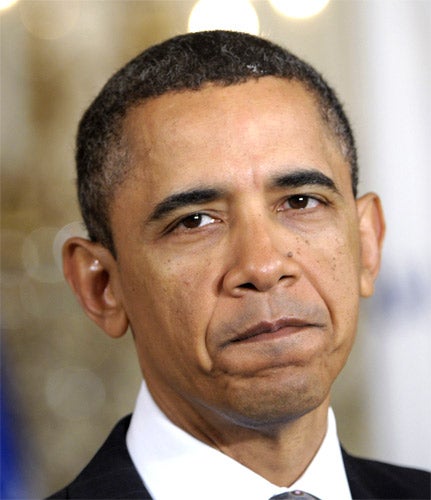Washington's strong words underline US impotence

The chaos on the streets of Cairo has raised the stakes even higher for President Barack Obama – underlining Washington's powerlessness to shape events, and raising the spectre of the US having to deal with a close ally whose regime it has disowned, but which uses violence to survive, temporarily at least.
As clashes between anti- and pro-Mubarak supporters intensified yesterday, with the outcome utterly unclear, the White House "deplored and condemned" the violence, and expressed its outrage at the attacks on peaceful demonstrators and the media. It was "imperative" the violence stopped, Robert Gibbs, Mr Obama's spokesman, said, urging restraint on all sides.
In reality, those words merely underline the helplessness of the administration, at this point reduced to watching TV like everyone else, and keeping its fingers crossed about how events unfold – in Egypt most immediately but also in other friendly countries in the region, most notably Saudi Arabia and Jordan.
That was another sign that Mr Obama's room for manoeuvre has been further reduced, now he has thrown the weight of the US publicly behind the demonstrators demanding change, and signalling that President Mubarak's concession that he would step down at September's election did not go far enough.
"An orderly transition must be meaningful, it must be peaceful and it must begin now," the US President said, hours after the Egyptian leader had spoken on Tuesday. The operative word was "now", officials here added, making even clearer where Mr Obama stood.
Now however Mr Mubarak appears to have called that bluff. In a final gambit to retain power, he seems to have called out his supporters on the streets in a plainly orchestrated attempt to dislodge the tens of thousands of protesters who for a week have been demonstrating peacefully for an end to his regime – presenting it as a spontaneous response by ordinary citizens who have had enough of the disorder.
"If the government instigated the violence, that must stop," Robert Gibbs, the White House, spokesman said.
The move may be wholly cynical. But the net result has been to leave the US scrambling to find a coherent response to events that change day by day, even hour to hour. Its basic problem though has been the same even before the crisis erupted: how to preserve a key national security alliance in the Middle East, yet get on the right side of history.
Mr Obama's statement came after a 30-minute phone conversation with Mr Mubarak – and it contained his most unequivocal backing yet for the pro-democracy demonstrators. Their "passion and dignity" was "an inspiration to people around the world", the President declared. "We hear your voices."
Some experts urge Washington to respond to Mr Mubarak's apparent defiance by cutting off the annual $1.5bn of aid and military support it provides Egypt, its strongest leverage against the regime. Yesterday Mr Gibbs would only say the matter was under constant review.
But there is an opposite and perhaps even greater risk, that the White House tacitly go along with the crackdown in the hope that stability can somehow be maintained. This, analysts say, is what Mr Mubarak is seeking – but it would only delay the inevitable, and in the meantime increase hostility to the US in Egypt and across the region.
Thus far, anti-American slogans have been conspicuous by their absence from Cairo's streets. But that could change and bring closer the ultimate nightmare of officials here: a re-run of 1979, when the Shah of Iran, an earlier key US ally, was driven from power and replaced by the Islamic regime that ever since has been America's biggest rival in the region.
Join our commenting forum
Join thought-provoking conversations, follow other Independent readers and see their replies
Comments